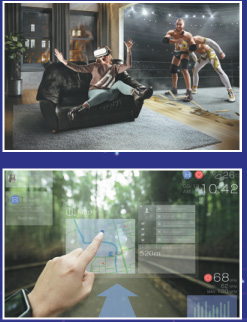Imagine that! Virtual reality


As science advances exponentially, the choice between living in a real or simulated world may just be around the corner
It's late. The wrought iron gates of the cemetery stand just ahead, but what's on your mind right now is the rain, falling in sheets and getting home as fast as you can. Your car is back there, hung up in a ditch where you skidded off the road, braking to avoid the washout. The quickest way home-the shortcut through the cemetery, then back to the main road.
"Abandon hope all ye who enter here" flashes through your mind. You struggle up and over the cemetery gate, and trudge on, finding your way through the low lying mist. Wait is something moving just up there, among the headstones? That's nuts. Nobody would be out this late, in a storm. But that something is moving and you can see clearly, a lost face, pale and ashen, a face of terror and madness. You feel your guts get tight. This is unreal. But wait. Don't be afraid. You're in control. You're in virtual reality-where anything can happen. Let your imagination soar. You could be the hero of your own life's epic adventure.
"The only limitation is what we have bonded to our imaginations, so dinosaurs, or outer space, or aliens, anything that is under our imaginations could be realized, to certain degrees of virtual reality," says Henry YK Lau, associate dean, (Innovation) at Hong Kong University's Faculty of Engineering.
The shape of things to come
The future presents a pretty cloudy picture-a specter even. You know-things like robots taking jobs-millions and millions out of work-bitter, alienated and nothing to do? You might even think, we're living in an age of monsters: exotic diseases able to spread around the world, mass extinction and yikes! scientists say an asteroid could wipe out everything; reasons to want to escape to a place that feels safe, like virtual reality. So, we asked the experts: could we, someday, choose between life in reality or in virtual reality?
"Sure. In my book I lay out what I call the Road to the Simulation Point, which consists of stages of technology or gates that would have to be crossed. (We have reached) what I would call stage 5 (of 10), so we're half way there," says Rizwan Virk, a computer scientist, engineer, and executive director of Play Labs, at the Massachusetts Institute of Technology. His book, The Simulation Hypothesis, published in March, is a current bestseller on Amazon.com. Virk predicts that inside a century, science will produce a simulation game, indistinguishable from reality.




































